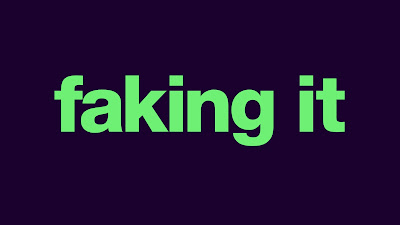The first Trick or Treaters arrived shortly after 6 pm, three adorable offspring of a kid that grew up across the street. It doesn't seem like all that long ago that their father was donning a Power Ranger costume and begging for candy. There was a time when we had dozens of candy-beggars, but tonight we've had only 6 -- and 3 of them were giggling high school girls who clearly have not read the age restrictions for Trick or Treaters in our community. With less than 10 minutes left until the 8 pm "lights out," I am confident that I will not need to open the backup bags of candy on the kitchen counter.
Faking It.
As I reminded my Themes in Lit class today, today was the first day of the new marking
period, and the halfway point for the first semester. It is also the
halfway point in the 21 days to happiness project - which I am hoping my
students are actually doing, and aren't trying to fake their
results. I feel like I am a hundred years old when I utter those
fateful words, "by cheating, you're only cheating yourself," yet it
really is true. (So, kiddies, buckle down, buckle up, and let's ride
through the rest of this semester as happy, honest, researchers!) Ask yourself, though.
How often do you fake happiness?
Granted, it's Monday, and it was o'dark-thirty when I left my house. No sunrise to admire, and a chilly enough morning that getting out of bed was tough. Similar attitudes were displayed by virtually everyone dragging themselves into school today. Pasting on the smiles, we greeted the kids, some of whom bothered enough to try to act happy.
Despite the dark start to the day, it's easy to find happiness in the enthusiasm of others. As I stood in the Commons this morning, Tanner walked in, strumming is ukulele. Nine weeks ago, he didn't even own the instrument, yet chose it as his TDO for the semester. Now it is an extension of his arms almost every day. He has an ear for it, and it is darned hard not to be happy around a guy who plays the ukulele with some level of accomplishment. I know for certain that Tanner is not faking it -- he is truly finding happiness in his new talent, and others, by extension, are finding joy in the music he shares.
Can I tell if someone is happy? I'd like to think so. Am I able to diagnose a faker? Less likely, although not impossible. Bottom line, however, is that my mother - and grandmothers - were right; "by cheating, you're only cheating yourself," out of happiness that you truly deserve.
So stop faking it! Even if it is Halloween.










